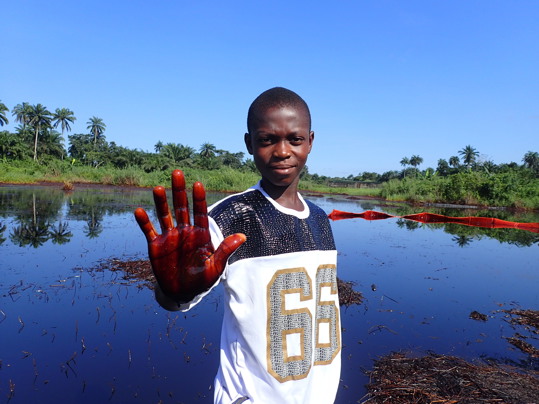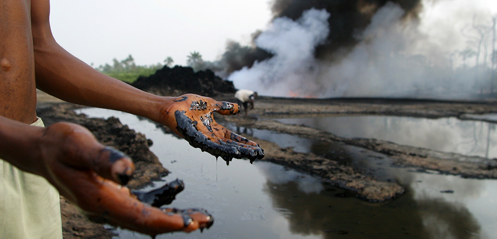Major insurers do little against serious human rights violations
The nine largest insurers in the Netherlands together invest more than 4 billion euros in eleven multinationals directly involved in serious and long-term human rights violations.
Even when they have been aware of pollution, land grabbing, violence and murder for years, a new report from the Fair Insurance Guide Netherlands indicates that most insurers take no or insufficient action against the companies involved. In doing so, they fail to comply with the UN Guiding Principles on Business and Human Rights (UN Guiding Principles), which were established ten years ago this month.

Image above: Papilou Roland holds up his hand to show the oil pollution in his community. His six year old brother Godbless died in 2016 after he fell in to one of these oil pools.
Which companies and violations are involved?
Fair Insurance Guide Netherlands, part of Fair Finance Guide Netherlands, examined eleven cases in which large oil, gas and mining companies such as Shell, Total and Glencore have long been involved in serious human rights violations, such as land grabbing, pollution of rivers (drinking water), and murder. Many of these abuses take place in conflict zones such as Myanmar, South Sudan or Nigeria. All nine insurers invest in several of these companies.
Why should insurers do something about it?
All nine insurers together invest more than 4 billion euros in eleven multinationals directly involved in serious and long-term human rights violations. As investors, insurers can be expected to engage in critical dialogue with these companies about human rights violations and use their influence to achieve improvements.
Which insurers are failing to take adequate action?
Achmea, Aegon, Allianz, ASR, Menzis, NN Group and VGZ were unable to demonstrate that they are taking sufficient action against human rights violations.
• Allianz was the only insurer that refused to cooperate in the investigation. Whilst Allianz invests no less than 2.7 billion euros in ten companies, they did not provide insight into how the company responds to violations, and therefore gets the lowest score (1). Transparency is an important aspect of the international guidelines for companies.
• ASR (score 3) and VGZ (score 2) get very low unsatisfactory marks.
• Aegon and Menzis only score 4.
• NN Group and Achmea remain at 5.
Which insurers are doing well?
Both Athora NL and CZ insurers were able to demonstrate that they are taking sufficient action against the violations as required by the guidelines. Therefore Athora NL (formerly Vivat) scores 8 and CZ score 7.
In 2018, the Fair Insurance Guide also investigated this issue.
“Three years on, the commitment of the insurers is still well below par,” says Titus Bolten of Amnesty International, on behalf of Fair Insurance Guide Netherlands. “The insurers invest fully in these eleven companies, but most of them do not make enough effort to enforce improvements. None of the insurers focuses sufficiently on recovery or compensation for the victims. The UN guidelines have been specifying the steps to be taken for ten years, but in the best case scenario, insurers only follow a few steps. In this way they let the human rights violations take their course and nothing changes in the situation of the victims."

Image above: Oil leaks continue to pollute vital community water sources.
Voluntary guidelines don't work, legislation is needed
The fact that institutional investors and other companies often fail to comply with voluntary international guidelines for human rights is a globally recognized problem. National legislation is therefore being introduced in more and more countries to hold them legally responsible. The European Union is also working on legislation, but that could take years.
'The victims don't have that time," says Titus Bolten "Their fundamental rights, such as the right to water or the right to an adequate living environment, have been or are still being systematically violated, while they have nowhere to turn. They receive no compensation for looted or polluted land, and no compensation for the loss of loved ones. A private member's bill on this issue is now ready in the Netherlands, to ensure that Dutch investors and other companies take up their responsibilities. After ten years of voluntary commitments to follow the guidelines, this research clearly shows that such a law is desperately needed.'
Athora NL and CZ are doing well; Allianz refuses to cooperate
Of the nine insurers, only Athora NL is doing well (score: 8). CZ scores a more than satisfactory 7. The six other insurers do not pass: NN Group and Achmea get a 5, Aegon and Menzis do not get further than a 4, ASR and VGZ get very poor marks - 3 and 2 respectively.
Allianz, a German insurer with 1.3 million customers in the Netherlands, was the only one unwilling to participate in the report, yet they invest no less than 2.7 billion euros in ten of the eleven selected companies. Allianz did not provide insight into how it responds to violations, and therefore gets the lowest score of 1. Transparency is an important part of the international guidelines for companies.
Read the full report in English which contains a description of the 11 cases of serious human rights violations, the main findings, the overview of all scores of the insurance groups and the recommendations of the Fair Insurance Guide to insurers and the government.
The Fair Insurance Guide Netherlands, founded in 2013, is part of the Fair Finance Guide Netherlands - a partnership of Amnesty International, Milieudefensie, Oxfam Novib, PAX and World Animal Protection.
Images courtesy of Milieudefensie.
